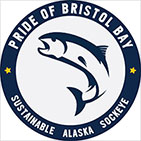Pride of Bristol Bay Melanie Brown: Bristol Bay Salmon MamaBy BJORN DIHLE
August 31, 2020
“It was exhausting,” Melanie said, remembering that first season. “Once, when I was really tired, my mom told me to go take a nap in the truck. After a short bit, I ended up sleepwalking back to go fishing.”
Salmon runs in Melanie’s blood. She is Yup’ik and Inupiaq - her people have been connected to the salmon, land and waterways of Bristol Bay since time immemorial. Her great-grandfather, Paul Chukan, commercial driftnet fished Bristol Bay during the end of the sailboat era. Commercial fishermen in Bristol Bay either driftnet or setnet to catch sockeye and other species of salmon. Driftnetting involves the use of a boat and allows fishermen to chase fish across different districts of Bristol Bay. Setnetting involves a specific site operated from the shore that, ideally, lies along the trajectory of where salmon are running. Native women, according to the stories Melanie has heard, came up with the idea of setnetting in Bristol Bay. While the men were away driftnetting, women came up with the idea to motor out a net and stretch it perpendicular to the shore. Women negotiated deals with canneries across the bay and were incorporated into the fishery.
The setnet site just upriver from Melanie’s family was fished by Governor Jay Hammond and First Lady Bella Hammond. Jay passed on in 2006, and is remembered a good, fair and respectful leader by Alaskans across the state. Bella lived alone at the couple’s homestead on Lake Clark until last winter, at the age of 87, when she, too, passed. The Hammonds, like Melanie and the majority of Alaskans, were adamantly opposed to the proposed Pebble Mine. Bella is remembered as a private person, except for when it came to protecting Bristol Bay. Now, the Hammonds’ setnet site is operated by their daughter Heidi. “They were good, down to earth people. Hardworking people like us,” Melanie said, remembering Jay and Bella Hammond.
Many setnet operations are worked by multiple generations of a family. At first, Melanie worked alongside her great-grandfather Paul Chukan. Later, once she became a mother, Melanie started her daughter fishing at age 10, too. Her daughter, now 18, and son, 13, now commercial fish alongside Melanie and her parents. If you were to hang out at the airport in the Bristol Bay town of King Salmon at the start of fishing season, you’ll meet people flying in from locations around the state, ranging from tiny villages to Anchorage - coming “home” to work their family’s setnet operations. Fishing is hard work, but it also serves as a family reunion. For many people, specifically Alaska Natives, fishing Bristol Bay strengthens their connection to their culture, salmon and the land. Pebble threatens that connection, as Melanie and many others point out.
“That’s what really breaks my heart—the thought that the connection to my culture, to the Native foods of Bristol Bay, could be broken. Without salmon, Bristol Bay would become a desolate place. They don’t just nourish the people; they nourish the land. It’s a sad thought to think that could be disrupted,” Melanie told me. “The disappearance of salmon has happened all over the world. My hope is our collective consciousness can keep projects like Pebble from destroying places like Bristol Bay.”
The threat Pebble poses to Native culture, as well as to the $1.5 billion fishery that generates more than 14,500 jobs each year, is why Melanie has worked for years advocating against the mine. She’s crisscrossed the state and, with her friendly openness and firm convictions, inspired countless people to get involved in fighting for salmon. Besides commercial fishing, Melanie works as an organizer for SalmonState. The nonprofit fights to ensure Alaska’s salmon don’t share the same dismal fate of salmon elsewhere in the country and the world.
Melanie is a self-described foodie. Her favorite foods are simple, traditional and local: things like salmon, berries and herring eggs. “I call them is ‘what it is’ foods. Native foods. I grew up an urban Native, but fortunately each summer my parents would return to my family’s roots. The thing that really makes me feel connected to my culture is food, and the process of preparing food. Amy Gulick (author of the book “The Salmon Way”) said, ‘Salmon bring people together.’ And it’s so true. Fishing, processing and eating—it brings people together.”
|
|||||||||||







